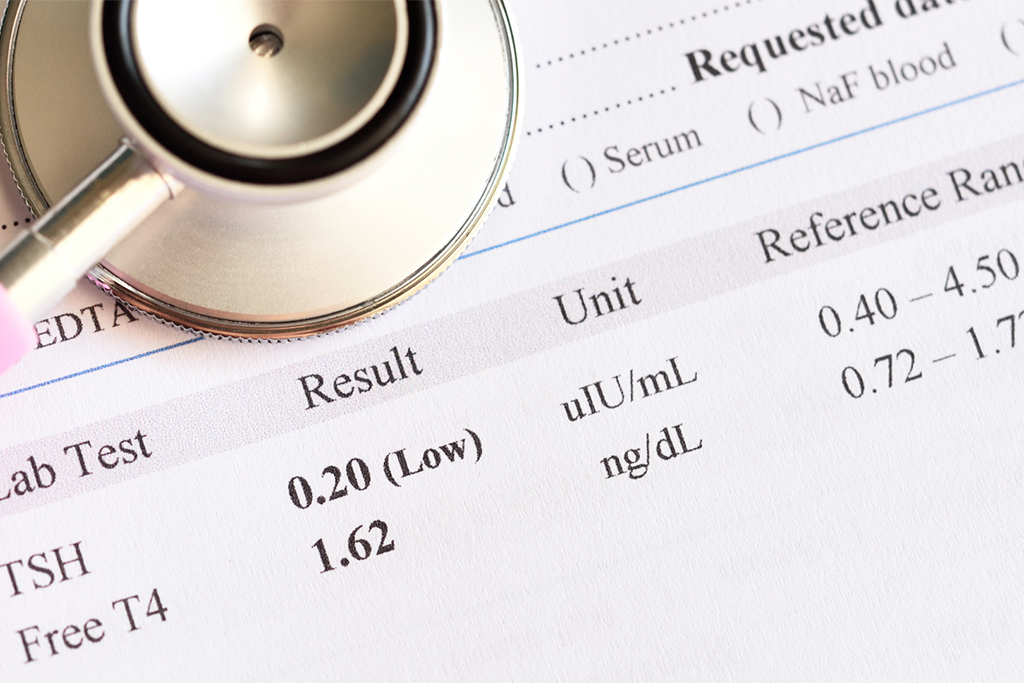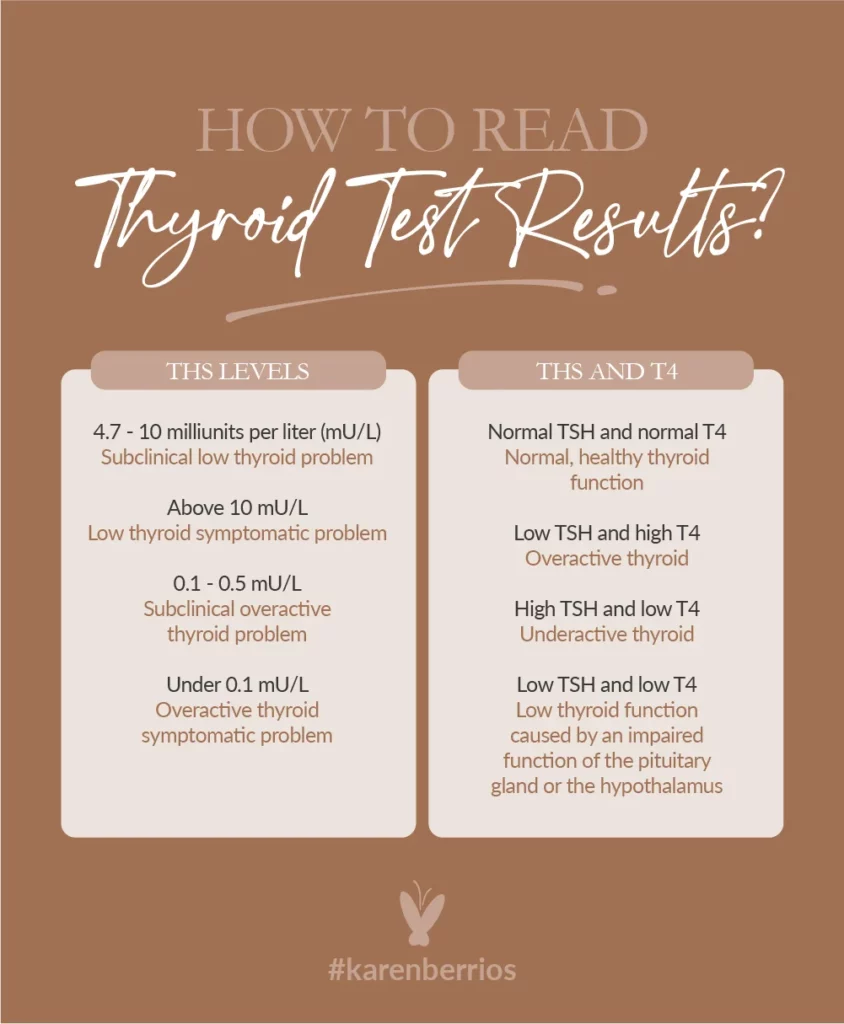

How To Read Thyroid Test Results?
Reading thyroid test results can be daunting and overwhelming, especially if you’re told to wait for your doctor to review them. During that waiting time, you’re most likely anxiously heading to Google and typing in each line you see on your papers. And more often than not, this leads you down an even more anxious spiral.
Worrying about the health of your thyroid is a valid one, as more and more people seem to experience some sort of disorder. Catching diseases and inflammation early is the best way to prevent complications down the road, and knowing what’s written on your thyroid test results helps you choose the next steps, even before your doctor’s appointment.
First and foremost, there are different thyroid blood tests, but they’re all designed to help analyze your thyroid’s function and measure the substances produces by your thyroid gland. They measure the levels of thyroid-stimulating hormone (TSH), thyroxine (T4), triiodothyronine (T3), thyroid antibodies (TPOAb, TRAb, TgAb), and thyroglobulin (Tg) that’s specifically important for thyroid cancer discovery.
All of these tests help detect conditions of low thyroid function or hypothyroidism, overactive thyroid function or hyperthyroidism, as well as autoimmune conditions such as Graves’ disease or even cancer.
When reading your test results, you’ll usually see reference ranges next to your numbers. These indicate where your results should be in order to be considered healthy. If your values are lower, they usually signal low thyroid function and if they’re higher, they may be a sign of an overactive thyroid.
Thyroid Hormones
It’s important to break down the thyroid hormones first, so you know the roles they play in your overall thyroid gland function.
- Thyroid Stimulating Hormone (TSH) or thyrotropin is a hormone produced by the pituitary gland and it regulates the hormone production of your thyroid gland. When your thyroid hormones are low, the pituitary gland produces more TSH and releases it into the bloodstream so it can stimulate your thyroid gland into producing more hormones. On the other hand, when thyroid hormone levels are high, the pituitary gland makes less TSH.
- Thyroxine (T4) is the most important thyroid hormone produced by your thyroid gland. It’s involved in many different body processes from heart and muscle function to digestion and brain development.
- Triiodothyronine (T3) is the active form of the T4 thyroid hormone and it’s either produced by the thyroid gland or converted from T4.
TSH Function Test
Even though there are many thyroid function tests, the one test that arguably gives the most insight is TSH, as any values outside of the normal range usually suggest some kind of a thyroid disorder or thyroid disease. The usual reason for getting this test done is a combination of symptoms that may indicate hypothyroidism or hyperthyroidism.
The American Association of Clinical Endocrinologists (AACE) and the American Thyroid Association (ATA) issued guidelines for the following TSH values:
- 4.7 – 10 milliunits per liter (mU/L) – subclinical low thyroid problem
- Above 10 mU/L – low thyroid symptomatic problem
- 0.1 – 0.5 mU/L – subclinical overactive thyroid problem
- Under 0.1 mU/L – overactive thyroid symptomatic problem
TSH, T4, and T3
When compared to your thyroxine or T4 levels, TSH may showcase an even more detailed picture of your thyroid function. Usually, it’s read as:
- Normal TSH values and normal T4 values – normal, healthy thyroid function
- Low TSH values and high T4 values – usually stand for an overactive thyroid
- High TSH values and low T4 values – usually stand for an underactive thyroid
- Low TSH values and low T4 values – usually mean low thyroid function caused by an impaired function of the pituitary gland or the hypothalamus
And when compared to your triiodothyronine or T3 levels, there are two options:
- High TSH values and low T3 values – indicate low thyroid function
- Low TSH values and high T3 values – indicate an overactive thyroid
Low Thyroid Function Results
If your test results indicate low thyroid function, it’s a sign of hypothyroidism, which makes your metabolism slow down. This is usually followed by inexplicable weight gain, tiredness, and fatigue, low body temperature, skin and hair dryness, constipation, inability to tolerate cold temperatures, low libido, water retention, heavy or irregular periods, and sleep disorders.
The usual causes of hypothyroidism are Hashimoto’s disease, an autoimmune disease where your body’s immune system attacks and damages the thyroid gland, regular thyroiditis or inflammation of the thyroid, iodine deficiency, radiation, surgical removal of the thyroid, as well as in some cases, pregnancy.
The treatment of hypothyroidism involves thyroid hormone replacement therapy which helps increase the amount of thyroid hormone your body produces, bringing them into a healthy range. With it, changes in diet and exercise are also very important. Reducing inflammation is your number one goal, and a clean and varied, plant-focused diet with micronutrient and antioxidant-rich superfoods supports your immune function, helping you fight free radicals and their irreparable damage.
If left untreated, hypothyroidism can become a serious and life-threatening medical condition, affecting your heart, brain, and respiratory system.

High Thyroid Function Results
On the other hand, high thyroid levels indicate hyperthyroidism, a condition where your thyroid gland produces too much thyroid hormone. This causes an increased metabolism and weight loss, rapid or irregular heartbeat, anxiety and irritability, tremor, sweating, sensitivity to heat, diarrhea, insomnia, and muscle fatigue.
The causes of hyperthyroidism include the autoimmune thyroid disease Graves’ disease, Plummer’s disease, and thyroiditis. The current treatment involves taking radioactive iodine, anti-thyroid medications, beta-blockers, and even surgery where the thyroid gland is removed.
If left untreated, hyperthyroidism can cause heart and eye problems, brittle bones, red and swollen skin, as well as thyrotoxic crisis, a sudden and rapid intensification of your symptoms, leading to a fever, a rapid pulse, and even delirium.
Thyroid Results and Cancer
Unlike your regular thyroid blood tests, detecting thyroid cancer actually involves a biopsy that’s usually done on all thyroid nodules that seem to be enlarged. In some specific cases, your doctor might use additional molecular tests to look for specific gene changes in the cancer cells, especially if the biopsy results aren’t clear.
Thyroid blood tests are usually not used to detect thyroid cancer, but they can help diagnose impaired thyroid function and inadequate thyroid hormone levels. These results can help your doctor decide what other tests may be needed and whether or not they should order a biopsy.
Thyroglobulin (Tg) is a protein made by your thyroid cells and testing its levels is used as a tumor marker test, helping guide your cancer treatment and determine whether or not it’s successful.
Final Thoughts
Reading your thyroid results is actually fairly straightforward, but since some of the irregularities can be caused by an impaired function of the pituitary gland or the hypothalamus, it’s still important to get a comprehensive panel as well as a thorough examination by your doctor to figure out the exact root cause. Only then you’ll be able to receive the right treatment for you and your condition.

hey there
I'm Karen!
I have found my cancer journey to be a positive and profound transformational experience. I’m inspired to share my healing journey here, and trust you’ll find hope, encouragement and purpose as you discover the healing power that lies within you.
Join
The Mailing List!
By signing up for my newsletter, you agree with our Privacy Policy and Terms & Conditions.


